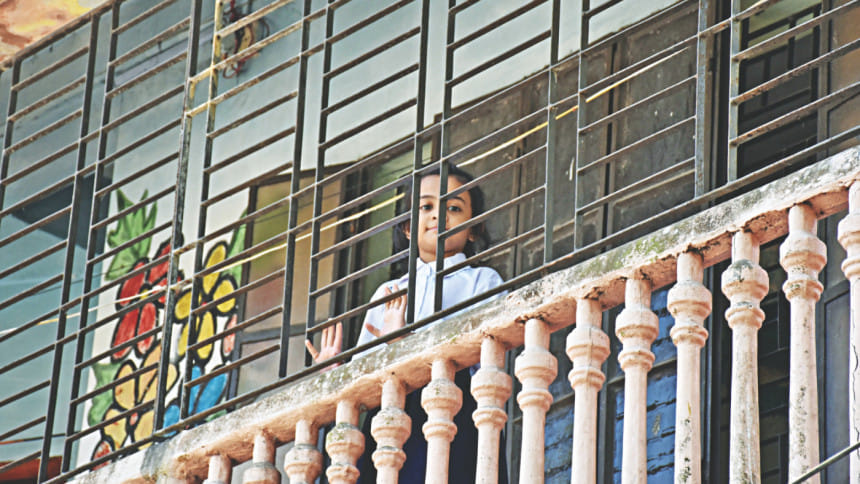All play, no school, Arhaans bored witless

Stuck at home for the past two weeks, Arhaan Habib, a kindergarten student, looks dejected. As he cannot go out amid the nationwide shutdown, he spends most of his time playing with toys and watching YouTube videos on mobile phone. He finds it extremely hard to concentrate on his studies.
The daily life of the seven-and-a-half-year-old boy has changed drastically since the government shut down schools to contain the spread of coronavirus.
"Nothing seems to be going right for my son. How long can you keep a child indoors?" asked Arhaan's mother Priyanka Wasim. The family lives in the capital's East Razabazar.
Priyanka said usually Arhaan wakes up around 6:30am to go to his school. But now that it's closed until April 11, he gets up around the same time only to find he has nothing to do. He loiters around for a while and then gets busy playing either with toys or his parent's mobile phones.
"I try hard, but he just can't concentrate on studies. As all his activities outside home have stopped, he seems sad and bored," Priyanka told this correspondent yesterday.
Like Arhaan, thousands of children are bearing the brunt of the current situation that arose after the coronavirus outbreak, which has apparently thrown their daily routine out of gear.
In such a situation, psychiatrists and psychologists say, if parents fail to handle the situation properly, it may have a negative impact on the children.
They suggested that the guardians should give more time to the children and make a daily routine for them, incorporating time for study, sports and other fun activities, to give them relief from monotony.
All educational institutions were declared closed on March 17.
A TOUGH TIME
"I wish I was a grown-up. At least I could go outside sometimes," said Zuairia Hasan, a grade-I student at Birshreshtha Munshi Abdur Rouf Public College in the capital.
"We are confined in our home and mother keeps telling us about the dos and don'ts all the time," she said, adding, "I really want to go out and play."
Nahid Islam Suravi, who lives with her family in Saheb Bazar area at the capital's Azimpur, said she was going through a tough time. She finds it extremely difficult to keep her two children indoors.
"They've become restless. They are not paying heed to my words," she said. "They keep asking me what they shall do."
Suravi said she was trying to spend more time with her 10-year-old daughter and six-year-old son to strengthen their mental bond.
Nusrat Tuly, mother of second grader Saiful Islam Babu, said, "My son is now going to bed and waking up late. I might find it difficult to make him habituated to the usual routine once the situation would become normal."
She said her son, 11, was spending a lot of time playing games on mobile phones and watching TV.
Sumanta Mohanta, a private service holder, is also worried about his eight-year-old daughter. He said the girl sometimes seems irritated and remains busy with mobile phones.
EXPERT'S TAKE
Speaking on the matter, Prof Shalahuddin Qusar Biplob, chairman of psychiatry department at the Bangabandhu Sheikh Mujib Medical University (BSMMU), said in the given situation, children were being barred from social interactions and playing sports and doing other physical activities outside home.
The situation is forcing them into a life full of monotony, he said, adding that out of that monotony, children between 12 and 15 could engage in arguments with their parents and other guardians.
Besides, their dependency on mobile phones and TV can increase as parents tend to allow their children use the devices amid the shutdown to keep them at home.
In such a situation, sleep timing and the daily routine of a child can change, he added.
"If parents fail to handle this situation properly, it may have a negative effect on children. It can create some problems when the situation will become normal."
This situation, however, has some positive aspects, noted Prof Shalahuddin.
There are some children who don't listen to their parents, are not attentive to their studies, and are irregular in school. Parents should utilise this time to develop a stronger bond with them to bring them back on the track, he said.
"Both parents and children have a lot of free time now. Parents can development a good relationship with their children with their positive behavior."
WHAT GUARDIANS SHOULD DO
Prof Shalahuddin said guardians should keep their children busy by encouraging them to study, play sports and do other fun activities. "Everyone should participate in such indoor activities."
Parents should create a daily routine for children, including these aspects, so that they can replace it with the previous routine when situation would return to normalcy.
Prof Mahjabeen Haque, chairperson of Department of Educational and Counselling Psychology at Dhaka University, said guardians should not spread panic over coronavirus among children.
Rather, the guardians should teach them in an easy way how to adapt and deal with the shutdown, she told The Daily Star.
She said parents should handle this tough situation with clam while dealing with their children. "Guardians should give more time to their children and should not leave them on their own."
Children should be engaged in different household activities so that they stay busy during this leisurely period, she said, adding that it would be beneficial for their mental health.
Parents should not shout at their kids even if they don't listen to them, she added.


 For all latest news, follow The Daily Star's Google News channel.
For all latest news, follow The Daily Star's Google News channel. 



Comments